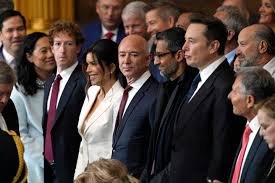Tensions have been on the rise between top tech leaders and his administration in the past months following Trump’s inauguration as the president of the United States. Notable tech leaders Tesla’s CEO Elon Musk, Amazon founder Jeff Bezos, Meta’s Mark Zuckerberg, and Apple’s CEO Tim Cook have shown interest and support for the current administration. However, following a series of political disputes and new policies, tension is beginning to foster between these tech giants and the new administration.
Trump’s administration has shown a big interest in regulating Big Tech like Google, Meta, Amazon, and Apple, and it’s no surprise as he mentioned his intent during his campaign to regulate the industry as it had “run wild for years, stifling competition in our most innovative sector.”
Concerns are being raised regarding antitrust practices and market dominance as speculations are being made about Big Tech monopolizing the market, which in turn stifles innovation in the industry and consumer choice. Due to this, big tech companies are under scrutiny from agencies like the Federal Trade Commission (FTC) and the Department of Justice (DOJ). Most times such scrutiny results in legal challenges and regulatory reforms.
For instance, in a news report from The NewYork Times, Meta is currently facing a federal antitrust lawsuit for “acquiring young rivals and depriving consumers of alternative social media platforms.” The FTC had first sued Meta in 2020 under Trump’s administration for buying young startups WhatsApp for $1bn in 2012 and Instagram for $19bn in 2014 and argued the purchases of the businesses were not to have been approved.
The case was dismissed by a federal judge in 2021, but it was soon revived as the FTC had more evidence to back up its claims. In the current administration, the trial for the lawsuit is to take place on the 14th of April 2025.
News outlets report Meta’s CEO, Mark Zuckerberg, visiting the White House regularly to curry favor with Trump and seek a favorable outcome for the trial; however, no report has been made about what the meetings were about. The tech giant would be forced to let go of its acquisition of WhatsApp and Instagram, should FTC win its case against Meta.
The recent unveiling of reciprocal tariffs during the Liberation Day White House event on the 2nd of April 2025 imposes a 10% baseline tariff on all imports to the US and will be in effect starting from April 5, 2025. There is also a 34% tariff on Chinese goods, which, when added to the existing tariff rate of 20%, brings it to a sum total of 54% tariff rate.
This increase significantly affects companies like Apple that rely heavily on China for manufacturing their products and derive nearly half of their revenue from their partnership with Chinese operations.
Despite Cook’s efforts to maintain a solid standing with the current administration by attending key events and making pledges for substantial US investments, Apple was not exempted from the tariff implementation. Thus, Apple shares have reduced by 9% since the implementation of the tariff, and analysts predict a 14% decrease in annual net profit should the tariffs remain.
The announcement of the tariffs also threatens the expansion of major tech companies with data infrastructures in the U.S., like Oracle, Google, Microsoft, and Amazon, crucial for advancing AI, since most tech equipment used is imported from China (54% tariff), Taiwan (32%), and South Korea (25%).
This will result in postponed or canceled data projects or reallocation of capital for other purposes, like the $500 billion Stargate AI project between ChatGPT, SoftBank Group, and Oracle, hence slowing down the development of cloud and AI technology.
Apart from trade tensions, Trump’s administration’s immigration policy has stirred up controversies in the tech sector. The tech industry relies heavily on skilled immigrants, and restricting immigration measures would limit the talent pool to choose from, thereby limiting innovation and competitiveness.
The relationship between tech leaders and the Trump administration is a key factor in the development of future tech policies. However, the current confluence of aggressive trade policies and strict immigration policies has heightened tensions between the administration and tech leaders.


